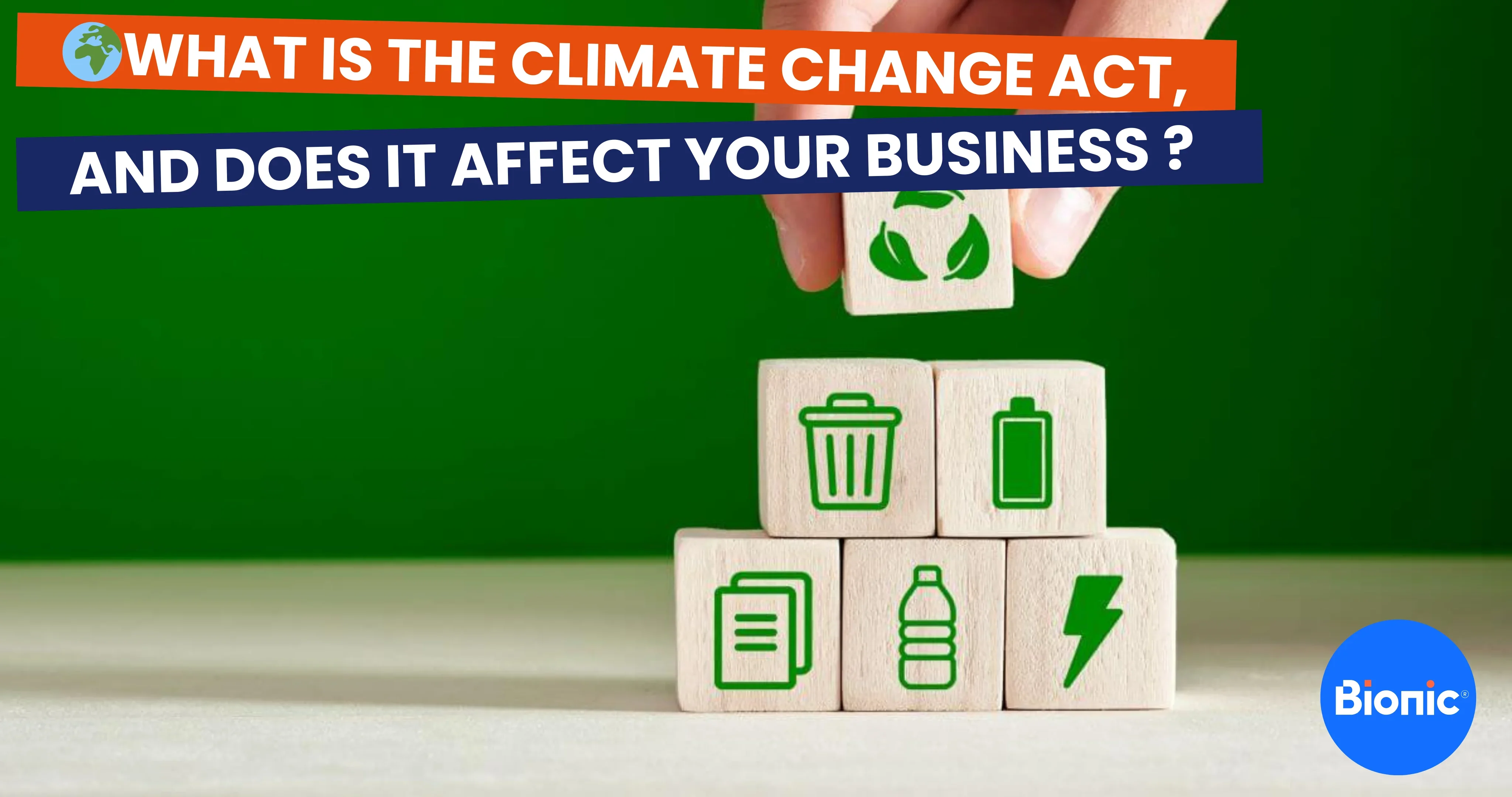What is the Climate Change Act, and does it affect small business owners?
Becoming a greener business is now a high priority for a growing number of business owners, even in a tough economic climate. According to a study conducted earlier this year, more than eight in 10 small businesses (88%) say there are areas of sustainability that are more important to them at the start of 2025 than they were a year ago.

We've already told you how climate change can affect how you run your small business. In this guide, we’ll take a closer look at how climate change legislation – especially the 2008 Climate Change Act – can impact your business.
We’ll also share practical tips on how you can align your business with its goals, manage risks, and make the most of any support that’s available.
Five-point summary of our guide to the Climate Change Act and your small business
- The UK Climate Change Act 2008 sets legally binding targets to cut greenhouse gas emissions to net zero by 2050, using tools such as carbon budgets and independent oversight.
- Small businesses are not the main target of the Act, but it shapes energy prices, regulations, customer expectations and supply‑chain requirements that affect SMEs.
- UK carbon budgets and climate policies encourage businesses to improve energy efficiency, switch to low‑carbon energy and reduce waste, which can also lower running costs.
- A growing number of large companies and public‑sector buyers now expect suppliers to measure and reduce emissions, so climate action is becoming a competitiveness issue for SMEs.
- There is financial support available – from government funding and local grants to guidance via the UK Business Climate Hub – to help small businesses invest in greener technologies and processes.
What is the UK Climate Change Act 2008?
The Climate Change Act is legislation passed by parliament in 2008 that created a long‑term, legally binding framework to cut UK greenhouse gas emissions. It initially set out clear targets to reduce UK carbon dioxide emissions by at least 80% from 1990 levels by 2050.
This target was strengthened in 2019 when the UK became the first major economy to pledge a net‑zero target. Net zero means lowering greenhouse gas emissions to as close to zero as possible and balancing any remaining emissions by removing an equivalent amount from the atmosphere. The new target means the UK needs to cut all greenhouse gas emissions to net zero by 2050.
While the Act mainly places duties on the UK government, it indirectly affects businesses of all sizes through changes to energy policy, regulation, taxation and market expectations.
How does the Climate Change Act address environmental concerns?
The Climate Change Act addresses environmental concerns by setting out clear ways to reduce carbon emissions and by creating a framework that keeps governments accountable over the long term. It lays out “carbon budgets” – caps on emissions – over fixed time periods and requires the government to bring forward policies to stay within those limits.
The Act legally requires the government to set these carbon budgets every five years, helping the UK both to reduce emissions and to adapt to changes already caused by climate change.
The Committee on Climate Change – now known as the Climate Change Committee (CCC) – was set up alongside the Act as an independent expert body that advises the government on targets and tracks climate progress. The CCC gathers evidence and data to show how the UK is reducing emissions, where it is off track, and what extra action is needed.
For small businesses, this framework translates into policies that influence energy efficiency rules, carbon pricing, climate‑related reporting and the availability of grants or incentives for low‑carbon investment.
What motivated the UK to implement the Climate Change Act?
The Act was a direct response to the international climate crisis and the need for a stable, long‑term plan to reduce emissions. The UK was the first country to enforce legally binding national carbon budgets in law.
The Climate Change Act was motivated by the need to cut the UK’s carbon footprint, protect people and nature from climate impacts, and give businesses and investors more certainty about the path to a low‑carbon economy. It helps ensure the UK plays its part in responding to the global climate emergency and meeting commitments under international agreements such as the Paris Agreement.
Across the world, countries are collectively trying to achieve net zero by balancing the amount of carbon in the atmosphere with the carbon removed from it. But to reach this stage, governments, businesses and individuals all need to work together to reduce activities that add unnecessary carbon to the air.
Good practices for individuals and business owners include opting for an electric car instead of petrol or diesel, cycling or using public transport when possible, limiting air travel, cutting down on how you use electricity at your business (for example, not leaving lights or computers on when you’re not in the room), and reducing the amount of waste you produce through reuse and recycling.
What are the key objectives of the Climate Change Act 2008?
The main objective of the Climate Change Act is to help the UK reach net zero emissions by 2050 in a planned and affordable way. To achieve this, the government has set out a series of policies and sector‑specific goals, including:
- Banning the sale of new petrol and diesel cars from 2030 – This is designed to accelerate the switch to electric vehicles, which are better for the environment and cause less pollution at the tailpipe.]
- Installing 600,000 heat pumps a year – The aim is to phase out most fossil fuel boilers by 2028 and shift homes and businesses to low‑carbon heating. Read our guide to find out more about commercial heat pumps for your business.
- Generating all electricity from clean sources by 2035 – Clean sources include renewables such as wind and solar, plus other low‑carbon technologies.]
- Leveraging new carbon capture technology – Using carbon capture, utilisation and storage (CCUS) to remove between 20 and 30 million tonnes of CO2 per year by 2030, particularly from heavy industry and power generation.
For small businesses, these high‑level objectives translate into more pressure to use energy efficiently, switch to lower‑carbon options and show customers and stakeholders how you are cutting your own emissions.
What are carbon budgets?
Carbon budgets are legally binding limits on the amount of greenhouse gas the UK can emit over five‑year periods. As of 2025, seven carbon budgets have been made law, and they currently run until 2042. Each budget sets an overall cap on emissions, with the aim of putting the UK on a cost‑effective pathway to net zero by 2050.
For small businesses, carbon budgets sit in the background but still matter. They drive the need to reduce emissions, improve efficiency, and support low‑carbon investment across the economy, which can influence energy costs, regulations and customer expectations.
Complying with carbon budgets can help your small business indirectly by encouraging measures that:
- Reduce energy costs and save money through improved efficiency.
- Give access to government grants, loans, and financial aid aimed at supporting green transitions.
- Maintain competitiveness by aligning with consumer and investor expectations for sustainable business.
- Keep you ahead of regulatory requirements and taxes related to energy use and emissions.
- Build resilience against risks associated with climate change, supply‑chain disruption and evolving market trends.
What are the benefits of the Climate Change Act?
There are lots of benefits stemming from the Climate Change Act, both for society as a whole and for businesses that respond early. They include:
- Emission reduction – Reducing greenhouse gas emissions can improve individual and public health, support more active lifestyles and help deliver cleaner air, water and soil.]
- Enhanced energy efficiency – Energy efficiency means using less energy to perform the same activity or produce the same result. Energy‑efficient buildings use less energy to heat or cool, and efficient appliances and electronics save both energy and money.
- Stimulated innovation and research – The UK has been particularly successful in lowering carbon emissions from electricity generation, with power‑sector emissions falling by roughly three‑quarters since 1990 as coal has been replaced by renewables and cleaner technologies.
- Green job creation – Green jobs are roles that focus on reducing emissions or improving the environment, such as sustainability specialists, low‑carbon engineers and green transport officers.
- Improved air quality and public health – Cleaner air improves quality of life and can reduce the spread or severity of some diseases and conditions, including asthma and cardiovascular problems.
For small businesses, a clear, long‑term climate framework can also mean more predictable policy, growing demand for low‑carbon goods and services, and opportunities to win work by showing strong sustainability credentials
What happens if we don’t act on climate change?
Climate change is a huge issue that's changing the world we live in, and global warming isn’t just an environmental emergency – it has knock‑on effects for health, food security, infrastructure and how you run your business.
The World Health Organisation (WHO) estimates that between 2030 and 2050, the effects of climate change could cause around 250,000 additional deaths worldwide each year, due to factors such as malnutrition from poor harvests, the spread of diseases like malaria and diarrhoea, and more frequent heat stress.
If we don’t do anything to reduce our carbon footprint, then unfortunately:
- Many species of animals will face higher risks of extinction as their habitats are destroyed or altered by wildfires, droughts, floods and rising temperatures.
- Superstorms, drought and other extreme weather conditions are likely to become more frequent or intense, contributing to poor harvests and food shortages.
- Agriculture could struggle to adapt, increasing the risk of regional or global food insecurity.
- Extreme heat waves could cause more humans and animals to suffer from heat stroke and breathing difficulties, leading to more illness and deaths.
For UK SMEs, unmanaged climate risks can mean more frequent disruptions to operations, supply chains and customer demand – as well as higher insurance costs and tighter regulations over time.
How successful has the Climate Change Act been?
Recent assessments suggest the Climate Change Act has been broadly successful in driving down UK emissions, particularly in the power sector, but that the pace of progress now needs to accelerate in other areas.
Data from the Climate Change Committee shows that UK territorial greenhouse gas emissions in 2024 were around 50% below 1990 levels, with emissions excluding international aviation and shipping down by just over 54%.
Government statistics also indicate that emissions in 2023 were roughly 53% lower than in 1990, with much of the reduction coming from a rapid decline in coal use and cleaner electricity generation.
The Climate Change Committee (CCC) concludes that the UK has met all of its carbon budgets so far and has a strong track record in reducing emissions from electricity supply, but warns that credible plans cover only about one‑third of the emissions cuts needed to hit the 2030 target.
Looking ahead, most additional reductions will need to come from sectors such as buildings, transport, industry, agriculture and land use, where current deployment of low‑carbon technologies is still off track.
For businesses, this means the Climate Change Act is likely to keep shaping policy and regulation, and that firms can expect continued pressure – and opportunity – to cut emissions, improve energy efficiency and build resilience to climate risks as the UK moves from target‑setting to faster delivery.
What can businesses do to align with the Act’s objectives?
There are several things you can do as a small business owner to make sure you’re doing your part to lower emissions and align with the Climate Change Act’s main objectives. You can:]
- Adopt a more energy‑efficient and renewable way of running your business – Check all your equipment to ensure it is working correctly, keep up with maintenance, and look for opportunities to upgrade to more efficient kit or switch to a greener tariff.
- Encourage low‑emission transport – Encourage staff car‑sharing, cycling schemes and public transport use where possible, and try to group supplier or customer visits into fewer trips.
- Look at your supply chain – Try to engage with more sustainable suppliers and materials. This could help your business demonstrate a real commitment to the environment and meet the expectations of larger customers. Review how you package products and explore options such as plastic‑free or recycled packaging where you can.
- Waste reduction and recycling – Encourage recycling and waste reduction, and educate your staff on the importance of following a simple, clear recycling system. You could offer incentives for customers who bring reusable cups or containers, depending on your business type.
- Employee engagement – Educate your staff on how their everyday actions affect energy use and waste, and consider dedicating time for training or running internal campaigns and challenges to reward sustainable behaviours.
You can also take more structured steps, such as setting a simple net-zero or carbon reduction plan, measuring your emissions using online tools, and joining initiatives like the SME Climate Hub to access free guidance and resources.
Is any financial assistance available to help small businesses comply with the Climate Change Act?
Yes, financial assistance and support schemes are available to help small businesses align with the Climate Change Act and support their sustainability efforts. These include:]
- The UK government has committed nearly £5 billion to assist businesses, including small firms, in reaching net zero emissions by 2050, although only about 11% of smaller businesses have accessed this finance so far.
- Public funding sources such as government grants and loans, including those found via the Government’s Find a Grant service, start‑up loans and Research and Development (R&D) tax relief for green product or service development.
Specific sustainability grants and funds available for small UK businesses include:]
- The Clean Growth Fund offers investments between £500,000 and £3 million for early‑stage cleantech startups.
- Local council grants such as the LEAP Small Business Grant in parts of London and the Green Business Grant in Glasgow, which can support energy efficiency measures, low‑carbon equipment or other sustainability projects – check your local council's website for details.
- Regional funding, such as the UK Shared Prosperity Fund, which offers grants to SMEs in various UK regions for business improvements, including low‑carbon upgrades.
It's also worth checking with banks and lenders for financing options, as some may offer green loans and sustainability‑linked lending to help with energy‑efficient equipment upgrades or renewable installations.
For more detailed information on financial aid and other green schemes, check out the government‑backed UK Business Climate Hub, which offers guidance, tools, and funding information to support business climate compliance and sustainability transitions.
Larger organisations may also provide financial or in‑kind support through supply‑chain decarbonisation programmes, so it’s worth asking major customers if they have any SME climate initiatives you can tap into.
How Bionic can help your business
We all want to see our businesses boom whilst doing our bit for the environment. This guide should have cleared up any confusion around the Climate Change Act and inspired you to lower your own carbon footprint. We can't make every operational change for you, but we can help you save time when sorting your business essentials – time that can be put back into your business or used to improve its green credentials.
Get in touch today with the Bionic team to discuss your business needs or get more information on business energy, including business gas and business electricity. We’ll compare quotes from our panel of trusted suppliers and talk you through the results to help you find an energy deal that supports your budget and sustainability plans.
FAQs on the Climate Change Act and UK small businesses
Here’s an at-a-glance guide to some of the most frequently asked questions about the Climate Change Act and UK small businesses:
What is the UK Climate Change Act 2008 in simple terms?
The Climate Change Act 2008 is a UK law that sets long‑term, legally binding targets to cut greenhouse gas emissions and reach net zero by 2050.
Does the Climate Change Act apply directly to small businesses?
The Act mainly targets government and the wider economy, but it affects small businesses indirectly through energy prices, policy changes and customer expectations.
How does the Climate Change Act impact UK small business energy bills?
By driving cleaner energy and efficiency policies, the Act can influence wholesale prices and green levies, while also creating opportunities to cut your own usage and costs.
Do UK small businesses have to report their carbon emissions under the Climate Change Act?
Most SMEs are not yet legally required to report emissions, but reporting rules are tightening and may expand, and many larger customers now expect basic carbon data from suppliers.
What practical steps can my small business take to align with the Climate Change Act?
You can improve energy efficiency, switch to low‑carbon tariffs or technologies, reduce waste and travel, and start measuring and managing your emissions with simple tools.
Are there grants or funding to help small businesses go greener in the UK?
Yes, there are national and local grants, green loans and funds like the UK Business Climate Hub, Clean Growth Fund and Shared Prosperity Fund to support low‑carbon investment.
Why does the Climate Change Act matter if my business is not a “green” company?
Because climate policy affects the whole economy, it can change your costs, risks, supply‑chain requirements and what customers expect, whatever sector you operate in.
How can Bionic help my business respond to the Climate Change Act?
Bionic can help you compare business energy deals, understand how energy and climate rules affect your bills, and free up time and money to invest in climate‑friendly upgrades.








